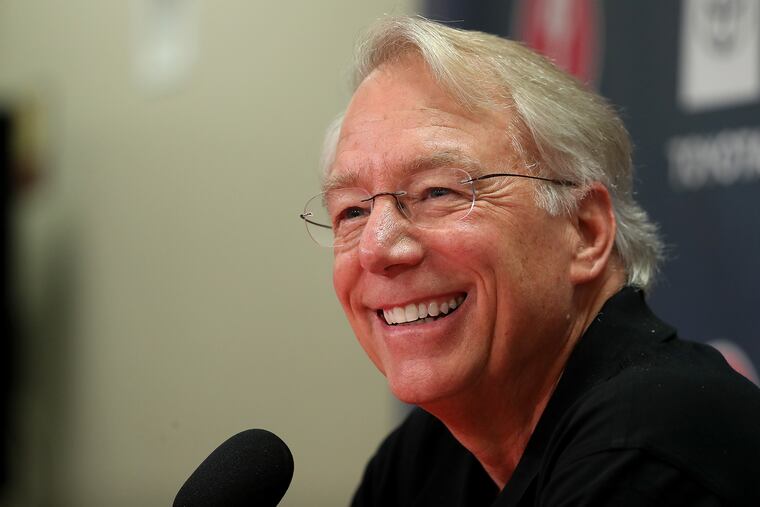Phillies president Andy MacPhail expects team to pay luxury tax
MacPhail said the Phillies and their ownership are “not reluctant” to exceed the tax. The Phillies, if they make a trade during the season, will likely find themselves crossing the threshold.

CLEARWATER, Fla. -- Scott Boras, negotiator of the three richest free-agent contracts of the winter, said as the offseason began that he did not expect the Phillies -- who had spent more money than any other team on free agents over the previous two offseasons -- to curb their spending.
“I don’t see any stop sign in John’s pursuit of his goal,” Boras said in November of Phillies managing partner John Middleton. “And that’s a world championship.”
A month later, the Phillies spent $132 million to sign shortstop Didi Gregorious and right-hander Zack Wheeler. Another free-agent spree seemed to be underway, no stop signs in sight. But then the chase came to a halt. The Phillies did not sign a major-league free agent until Tommy Hunter signed for less than $1 million on the eve of spring training.
Their rotation could have used a second free-agent starter and their bullpen would have been bolstered with a late-inning weapon. Instead, the Phillies stayed out of the market after Gregorious and Wheeler’s contracts brought them within striking distance of exceeding the competitive-balance tax, which the Phillies have avoided paying since Major League Baseball instituted it in 1997.
The Phillies seemed to hit a stop sign. But team president Andy MacPhail, speaking Friday at a news conference, said the Phillies and their ownership are “not reluctant” to exceed the tax. The Phillies, if they make a trade during the season, will likely find themselves crossing the threshold. A deal with the Cubs for Kris Bryant, which seems unlikely yet the Phillies have inquired about him, would put the Phillies into tax territory.
“It’s not an impenetrable barrier by any stretch. It’s my hope and, frankly my expectation, that we’re going to exceed it this year,” MacPhail said. “But nobody can live over it. The penalties are too severe -- not just economically, but it grabs you every different way.”
A team, like the Phillies, that exceeds the $208 million threshold for the first time would be charged a 20% tax on overages. A second consecutive season of exceeding the threshold brings a 30% tax on overages and the rate continues to climb the longer the team remains over the threshold.
Signing free agents -- which is usually how a team would exceed the threshold -- can often cause a team to forfeit draft selections and lose international spending money, which is what happened to the Phillies in recent seasons.
Any team that exceeds the threshold by $40 million has its highest draft pick moved 10 spaces. But a team can pay the tax for one season and lower its payroll below the threshold the next year in order to reset its repeat-offender status. The Phillies will have at least $50.5 million coming off the books after the season, which would allow them room to reset their payroll if they pay the tax in 2020.
“We’re right there now,” MacPhail said. “Now, we evaluate what we have and make a determination in-season as if we are going to go over or not. You don’t do this cavalierly. Because there’s a huge impact to your organization beyond money as well. When you go there, you want to feel that you have a good reason to go there and then it will pay off.”
Extra bases
Andrew Knapp will be reevaluated Monday after he suffered a ribcage injury on Wednesday. ... All 40 pitchers are in camp as Drew Storen arrived on Friday. ... Many position players have already reported, but the players are not mandated to be in Clearwater until Sunday.